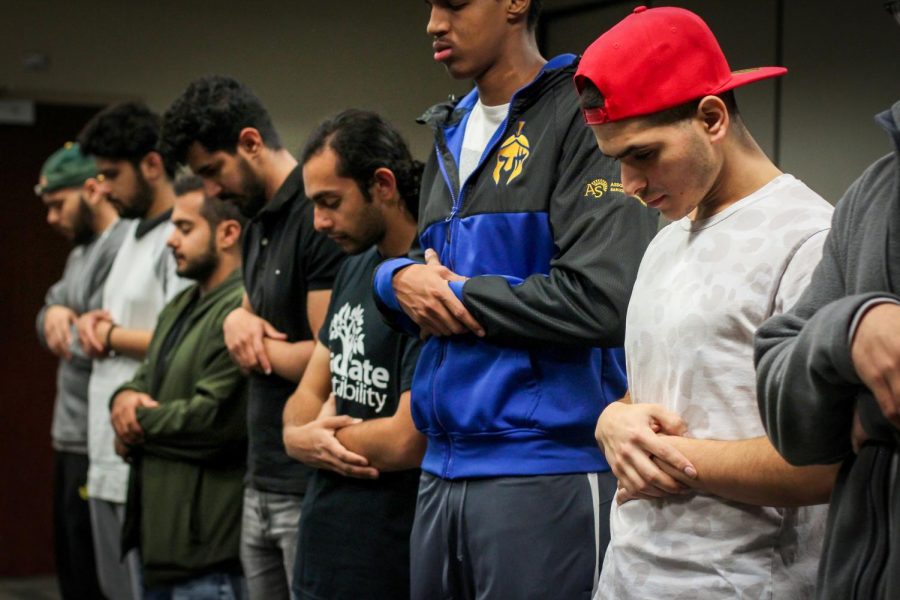Sac State’s Muslim Student Association keeps faith amid stigmas, finals
Members express different ideals in following Islam
Emily Rabasto – The State Hornet
Muslim students gathered in the Auburn room of the recently renovated Union, where they held a Jumah, or, Friday prayer on April 12.
What is the Muslim Student Association?
“As-salamu alaykum,” Faaiz Siddiqi said, as he stood behind the podium.
These Arabic words translate to “Peace be upon you” and commenced the Jumah, a Friday prayer, held in the Auburn room of the recently renovated University Union.
Siddiqi then handed the floor to another.
One attendee stood and began to sing a Quranic verse. The recitation consisted of long sustained notes, punctuated by intermittent inflections in pitch and tone, as he rotated slightly, first to the right and then to the left.
Sacramento State students sat in serene absorption of the words and their entrancing delivery.
Those who filtered in throughout the service performed a ritual before seating themselves among the others. They stood with folded arms, before bending at the waist to a 90 degree angle, placing their hands on their knees and finally bowing in prostration.
One woman seated near the back donned a hijab. A few men wore baseball caps. Some kept beards and others were clean shaven. Overall, they were uniform in their reverence.
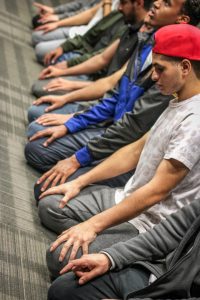
Muslim students knelt before bowing in prostration as the Jumah came to a close on April 12. The Friday prayers typically place around noon and feature an educational talk.
The Muslim Student Association (MSA) looks to foster a diversity befitting of their makeup, with many members coming directly from or tracing lineage to places such as Egypt, Pakistan, Syria, and others.
Members of MSA can be seen frequenting tabling areas near the library, as a means of educating people on Islam and its practices.
MSA treasurer Basit Choudhary likens the Friday prayers to the sabbath held by Christians on Sundays.
“What Jumah basically means is to gather,” Choudhary said. “A day where we gather and get to know one another and talk about stuff that happened over the week. But the primary objective is for prayer — to pray together.”
Unity is an important component for the MSA. Following the Christchurch shooting, where 50 people were killed in two mosques in New Zealand, the group wanted to act quickly to provide relief to the community.
Both Choudhary and MSA president Abdelrahman Mohammed, expressed gratitude toward Nelsen for expediting the process, which secured the venue for “A Night of Hope and Healing.”
Choudhary explained that the request came just two to three days before the event.
“We were really worried,” Choudhary said. “We didn’t know how many people to expect. We didn’t know how many volunteer hours or how much manpower we could get. But it went really, surprisingly well. We really appreciate that people, especially President Nelsen, and the whole of Sac State helped out.”
Mohammed said the March 23 event provided an invaluable platform, garnering widespread support from multiple communities and organizations.
“Some people were there because they were really feeling down about it, but I think one of the most important things was getting together and addressing the elephant in the room. We need to do something about this,” Mohammed said.
“A lot of the people in the audience were not necessarily from the Muslim community. There were different community leaders. Jewish community leaders, Sikh community leaders, the Christian community.”
While the two MSA board members state that they feel supported by the Sac State community and its administrators, the campus has not been impervious to religious intolerance throughout the years.
Less than a week after 9/11, a Muslim student was walking through the corridor between the library and the University Union, when she was spat upon by an unidentified white male, according to previous reporting by The State Hornet.
RELATED: Sac State Muslims not immune to prejudice
During rush week of spring 2016, a hateful message was written on an MSA sign-up sheet. The organization had left the form out in the Union during class and returned to find the message.
While campus police regarded the former incident as a hate crime — the latter was not.
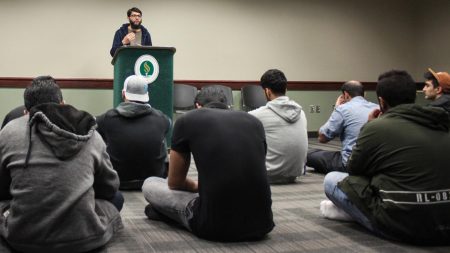
Faaiz Siddiqi leads the Jumah in the Auburn room of the recently renovated University Union on April 12. The Friday prayers are typically held around noon.
Following the incident, Nelsen released a statement to the campus community, “I was heartbroken and angered to learn that this happened on our campus . . . We will not tolerate hateful and racist behavior on this campus, and we will pursue sanctions against those who are identified.”
Mohammed said that the ramifications of Islamophobic violence and speech have left many in the Muslim community fearful, and that the shooting in New Zealand pierced a sense of safety that many sought in Western nations.
“Some people were very traumatized. ‘How am I going to be safe?’” Mohammed said. “‘I’ll just take my hijab off. I don’t want to be identified as a Muslim,’ because they’re scared.”
Mohammed said the loose nature of America’s gun laws make it difficult to ignore the possibility of violence.
“Some people are here, because of guidance or crisis. They don’t want to be classified as a Muslim,” Mohammed said. “People come here and their name could be Abdelrahman, like mine, and they’ll go by Abdul, Zechariah becomes Zach, or Mohammed becomes Mo.”
According to Mohammed, one of the most painful things to reckon with concerning the incident in New Zealand was that the perpetrator chose to carry out his attack in a mosque, a space designed to provide solace to the entirety of the Muslim community.
Nonetheless, MSA members have found respite through solidarity and expanded facilities on campus.
New amenities, fasting and finals
The recently renovated University Union’s new offerings include a meditation room and foot washing station on the second floor, while the Auburn Room on the third floor was host to a recent Jumah.
According to Mohammed, previous campus infrastructure relegated students practicing absolvement through foot washing to bathroom sinks, while prayer rooms would often draw a queue on the Union’s second floor.
“It was pretty small, to be honest,” Mohammed said. “Usually we would do shifts, so we’d have people waiting outside. It seriously was like a little hallway.”
Locating a venue to house prayers left Sac State students practicing Islam itinerant, with the prior week’s Jumah having been held outdoors near the library. Now, the size of the Union’s new meditation room allows for a larger occupancy.
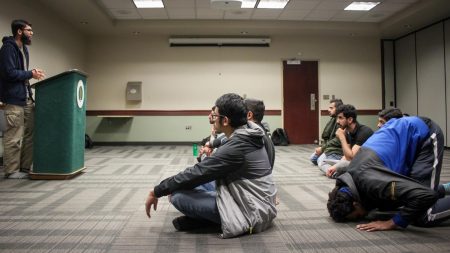
Muslim students listen as Siddiqi gives an educational lecture concerning the company one keeps. The Jumah, or, Friday prayer was held in the Auburn room of the Union on April 12.
The Friday prayers’ sole female attendee, Sac State student Reen Muaharam, said she was pleased by the new foot washing station, but that she would have enjoyed the inclusion of a few basic amenities.
“There’s no lock on the door, so anyone can just walk in on you,” Muaharam said. “As a woman, I wish there was more privacy. At least a sign on the door to let someone know you’re in there.”
As finals approach, students throughout campus will likely juggle a great number of tasks, but this year requires an additional undertaking for Muslim students specifically. The final week of school, whens finals take place, is scheduled for Monday through May 17, with Ramadan beginning just a week prior.
With a focus on fasting from sunrise to sunset, the month-long religious holiday — one of Islam’s most sacred — takes place in alternating times of the year. According to Mohammed, it is due to Islam’s subscription to a lunar, rather than Gregorian, calendar.
Choudhary explains that the first few weeks are an adjustment period for not just your stomach, but for an individual’s self-discipline and sleep schedule as well.
“You’re hungry. It’s hard to focus on your finals,” Choudhary said. “Like, my stomach rumbled really loud in class one year. My neighbors were chuckling quite a lot. So it is tough, but it is very rewarding when you overcome that trial of being hungry and still do your best on your exam.”
Rising early for a meal which will hold you over until sunset is essential, Choudhary said. He eats a bit more than he typically would and has found fibrous foods such as oatmeal to help stave off hunger.
“So we have prayer five times a day,” Mohammed said. “The first twilight until sunrise, that’s the time frame for the first prayer. So basically you can eat anytime between sunset and early twilight”
Mohammed said he views the practice as bringing consciousness of God to the forefront by being aware of one’s decisions.
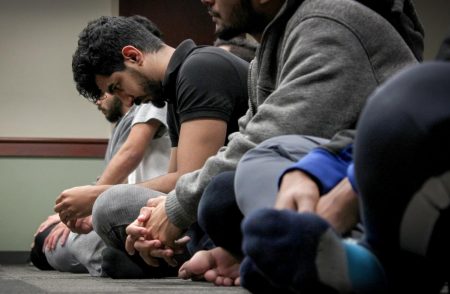
Muslim Students sit in reverence during the Jumah. The Friday prayer was held in the Auburn room of the recently renovated University Union, which also features a foot washing station and a meditation room on April 12.
He explains that there are cases for exemption from fasting, such as illness. But it is one such exemption that has drawn criticism from a female MSA member.
Sac State women’s studies major Roshelle Czar states that she does not care for certain traditions she sees as being divisive or exclusionary to women, but she chooses to engage her faith in a manner that is in stride with her own modernity.
“Women are actually not allowed to, if they’re on their period they’re not supposed to fast,” Czar said. “Because you are shedding blood, technically, your body is dirty. Your body is not considered pure at that time, so it’s not OK for you to be fasting.”
Czar feels that menstruation is cast in a shameful light, which can hinder a woman’s comfort with her body, and that it also attempts to appraise women through their genitalia.
“I have friends who would be on their period and still fast, because otherwise they’d feel awkward about it and they would feel awkward telling a guy, ‘Oh, I’m on my cycle and that’s why I’m not fasting,’” Czar said. “If you’re not fasting, obviously, the guy is going to know why.”
Just as Czar is unabashed in her love for her religion, despite there being certain things she would like to change, Choudhary is quick to identify the camaraderie inherent to Islam.
Choudhary said this is something he would like for people outside of the religion to understand, stating that it is a foundational right to extend the Islamic salutation of salaam, and receive peace in return.
“It doesn’t matter where you’re from, what background you’re from,” Choudhary said. “If you’re sending peace to them then they’re required to send peace back to you. If you were to say hello to some random person, they’re not obliged to say hello back to you, but in Islam they are.”
“You really feel like you’re part of something bigger, and that all these strangers, they’re not really strangers. They’re people whom you could trust and they’re all your brothers and sisters.”
Your donation will support the student journalists of Sacramento State University. Your contribution will allow us to purchase equipment and cover our annual website hosting costs.





























































































































